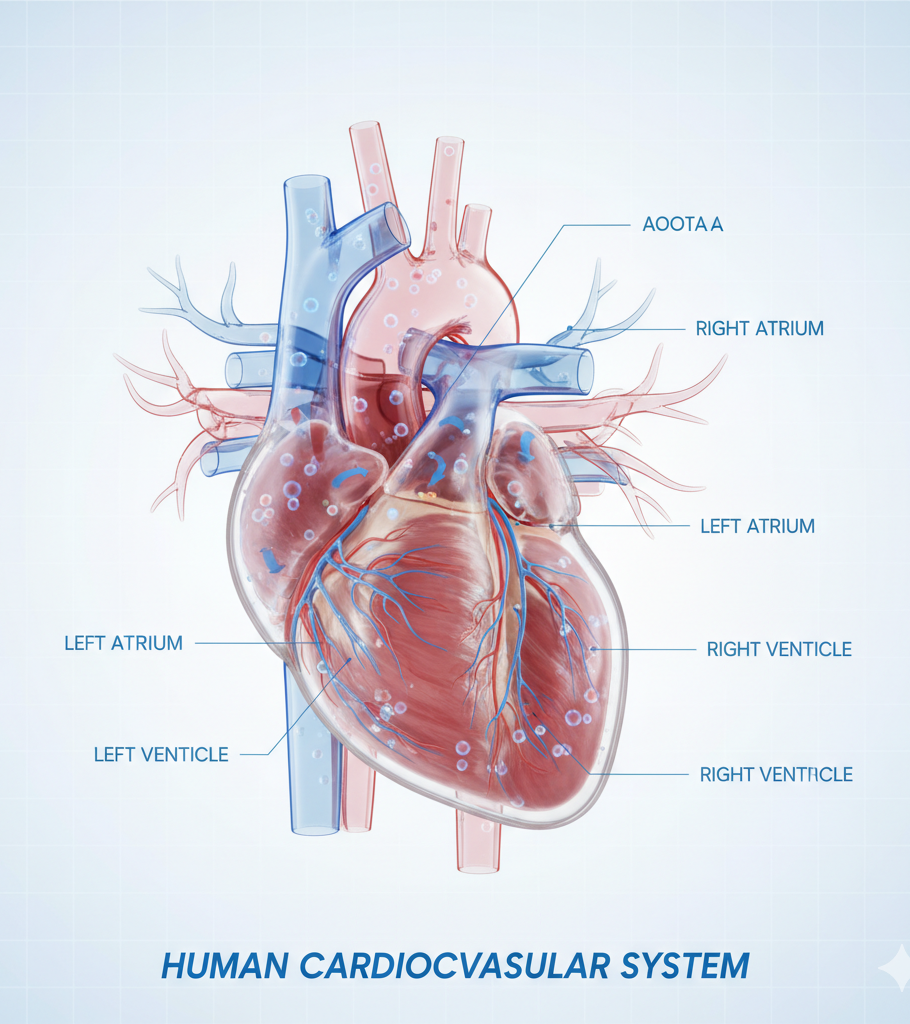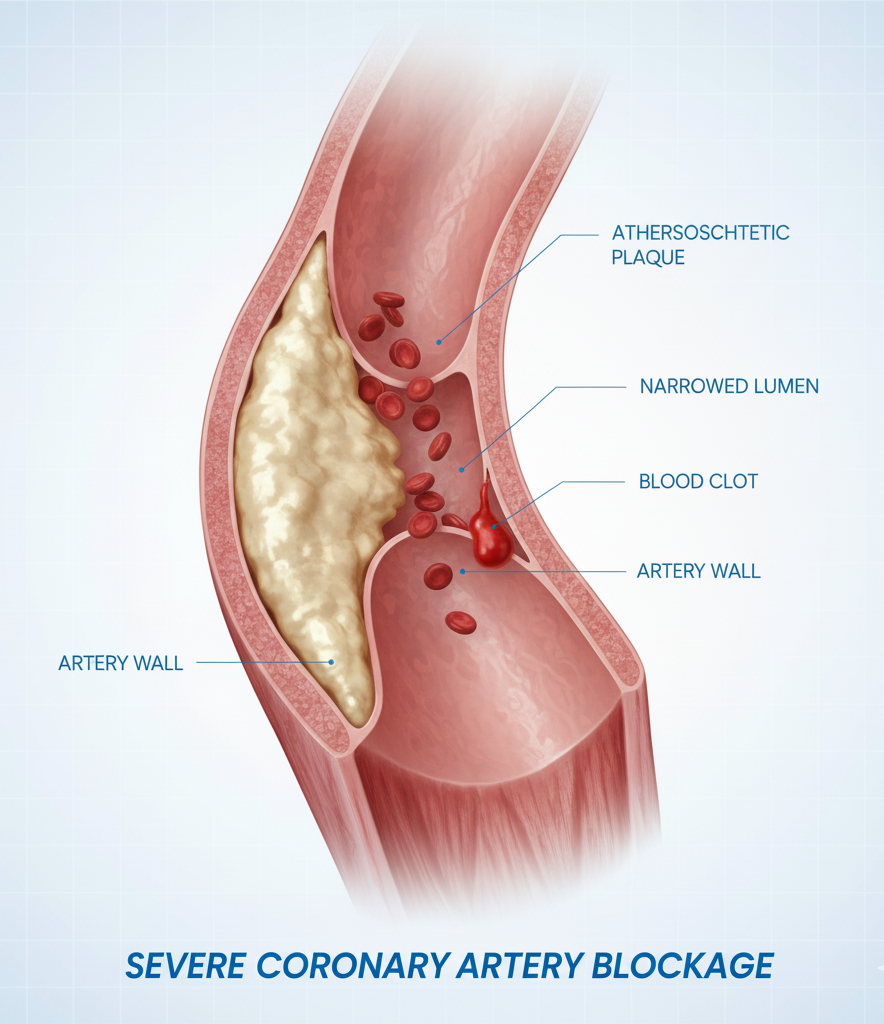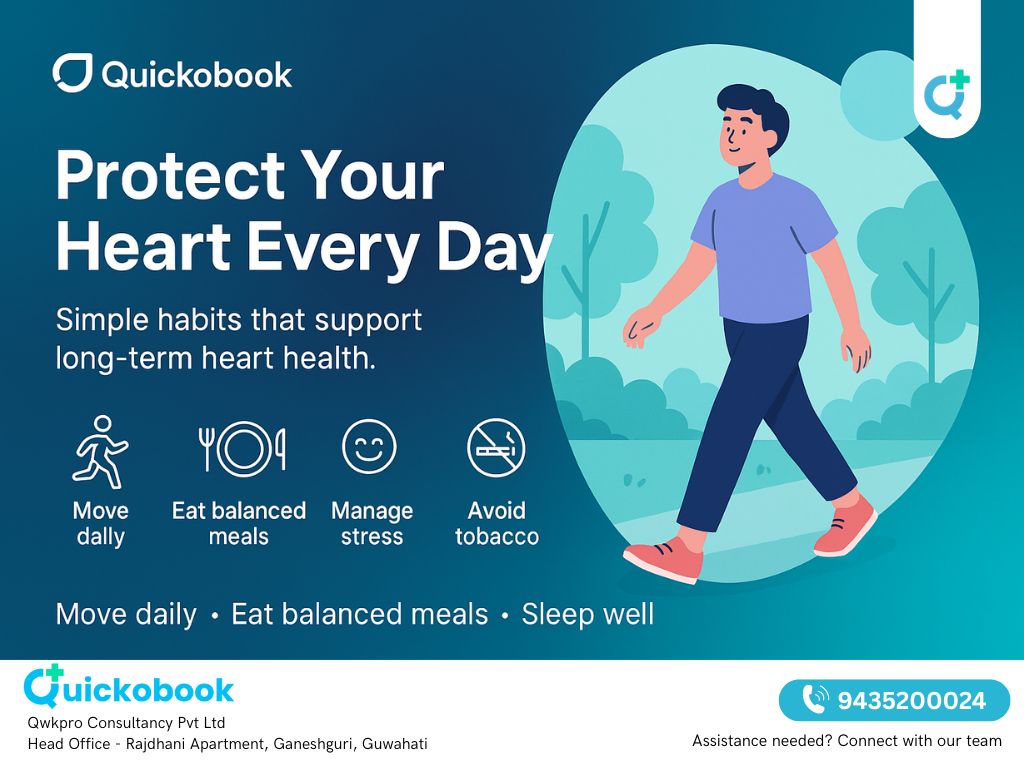INTRODUCTION
Your heart health depends heavily on your everyday lifestyle choices. Even small daily habits—like what you eat, how you move, how you sleep, and how you manage stress—directly influence your risk of heart disease. In India, heart problems are increasing rapidly, affecting people as young as 30–40 years. The good news is that consistent healthy habits can significantly support heart attack prevention and long-term wellness.
This blog explains practical, affordable, and Indian-friendly habits that protect your heart naturally.

Overview of Heart Health
Heart health refers to how well your heart and blood vessels function. A healthy heart pumps blood efficiently, keeps oxygen flowing to organs, and maintains normal blood pressure, cholesterol, and blood sugar levels. When these functions are disrupted, the risk of heart attack, stroke, and hypertension increases.
Good heart health is supported by:
-
Active lifestyle
-
Nutritious food
-
Balanced weight
-
Stress control
-
Regular checkups
Why Daily Habits Matter for Heart Attack Prevention
Heart disease develops silently over years. Small daily actions—both good and bad—slowly build up their impact. Healthy daily habits:
-
Keep arteries flexible and clean
-
Reduce cholesterol
-
Control blood pressure
-
Improve blood circulation
-
Support mental well-being
-
Lower inflammation
These benefits together significantly reduce heart attack risk.
Daily Lifestyle Habits That Protect Your Heart
1. Start Your Day With a Heart-Healthy Routine
A morning routine sets the tone for your health:
-
Drink 1–2 glasses of warm water
-
Move your body for at least 10 minutes
-
Have a high-fiber breakfast like oats, poha, sprouts, fruits, or eggs
-
Avoid skipping breakfast as it increases blood sugar spikes
2. Make Your Diet Heart-Friendly
A healthy diet is the strongest pillar of heart attack prevention.
What to eat more:
-
Whole grains (brown rice, oats, millets)
-
Fresh fruits & vegetables
-
Nuts and seeds (almonds, walnuts, flaxseed)
-
Lean protein (dal, chana, eggs, fish, chicken)
-
Healthy oils (olive oil, mustard oil)
What to reduce:
-
Deep-fried foods
-
Bakery items (trans fats)
-
Sugary drinks
-
Red meat
-
Excess salt
TIP: Try to include at least 5 servings of fruits and vegetables daily.
3. Exercise for 30–45 Minutes Daily
Regular movement is essential for heart health. Aim for:
-
Brisk walking
-
Cycling
-
Swimming
-
Yoga
-
Light jogging
-
Dance workouts
-
Home exercises
For office workers:
-
Stand up every 30–45 minutes
-
Take walking breaks
-
Use stairs instead of lifts
4. Manage Stress Wisely
Chronic stress increases blood pressure, inflammation, and heart risk. For daily stress control:
-
Practice deep breathing 5–10 minutes
-
Do meditation or mindfulness
-
Avoid overthinking
-
Spend time in nature
-
Talk to loved ones
-
Maintain work-life balance
5. Sleep 7–8 Hours Every Night
Poor sleep increases the risk of high blood pressure, obesity, and heart disease.
Tips for better sleep:
-
Avoid screens before bed
-
Follow a fixed sleep schedule
-
Keep your room cool and dark
-
Avoid heavy meals at night
6. Quit Smoking and Limit Alcohol
Smoking damages arteries and raises heart attack risk. Alcohol increases cholesterol and blood pressure.
If quitting is difficult:
-
Seek medical counselling
-
Use nicotine replacement
-
Join support groups
7. Keep Track of Your Numbers
Monitoring heart health indicators helps detect early changes:
-
Blood pressure
-
Cholesterol
-
Blood sugar
-
Body weight
-
Waist circumference
Get these checked every 6 months or as advised by a doctor.
READ ALSO: Metabolic Stress — Not Body Weight — May Explain Dementia Risk In Patients With Diabetes
8. Stay Hydrated Throughout the Day
Dehydration thickens blood and strains the heart. Drink 6–10 glasses of water daily depending on weather and activity.
9. Include Heart-Protective Superfoods
Add these to your daily diet:
-
Garlic – improves cholesterol
-
Turmeric – reduces inflammation
-
Flaxseed – rich in omega-3
-
Green tea – antioxidant support
-
Amla – strengthens immunity
-
Dark chocolate (70% cocoa) – in small quantities
10. Build Strong Social Connections
Loneliness and emotional stress can increase heart disease risk. Spend time with:
-
Family
-
Friends
-
Community groups
Positive relationships reduce stress and improve heart health.
When to See a Doctor
Seek a cardiologist if you notice:
-
Chest discomfort
-
Shortness of breath
-
Unusual fatigue
-
Rapid heartbeat
-
Dizziness
-
Swelling in legs
-
Persistent high BP or cholesterol
Early consultation helps prevent complications.
Risks and Complications of Poor Heart Health

Ignoring heart health can lead to:
-
Heart attack
-
Stroke
-
High blood pressure
-
Heart failure
-
Blocked arteries
-
Diabetes complications
-
Kidney issues
Prevention is always easier than cure.
Conclusion
Improving heart health doesn’t require expensive treatments—it starts with small, consistent lifestyle changes. Daily habits like healthy eating, regular exercise, stress control, good sleep, and avoiding smoking dramatically reduce the risk of heart attack. By taking care of your heart today, you build a healthier and longer life for tomorrow.
Quickobook CTAs
-
Book a cardiologist near you on Quickobook for a heart checkup today.
-
Schedule a routine health screening through Quickobook App.
-
Consult online if you notice symptoms related to heart health.
50 FAQs (Q / A Format)
-
What is heart health?
Heart health refers to how well your heart and blood vessels function. It includes blood pressure, cholesterol, and circulation. -
Why are lifestyle habits important for heart health?
They help control weight, blood pressure, and cholesterol. Small daily habits lower heart disease risk. -
How much exercise is needed daily?
Aim for 30–45 minutes of moderate activity. Walking is one of the best options. -
Can diet alone protect the heart?
Diet plays a major role but must be combined with exercise and stress control. No single change works alone. -
Which foods are best for heart health?
Fruits, vegetables, whole grains, nuts, and lean proteins. Avoid fried and packaged foods. -
Is walking enough for heart attack prevention?
Yes, brisk walking daily improves circulation and reduces risk. Consistency matters. -
How does stress affect the heart?
Stress increases blood pressure and inflammation. Over time, it raises heart attack risk. -
Does sleep influence heart health?
Yes, poor sleep increases blood pressure and weight gain. Good sleep protects the heart. -
How much water should I drink daily?
Most adults need 6–10 glasses based on climate and activity. -
Are Indian diets healthy for the heart?
If cooked with less oil and salt, Indian diets can be very heart-friendly. -
Is ghee bad for heart health?
Moderation is key. Excess saturated fat increases cholesterol. -
Do genetics play a role in heart disease?
Yes, family history increases risk. Healthy habits still help reduce it. -
Can young people get heart disease?
Yes, cases are rising in people aged 30–40 in India. -
Does drinking green tea help?
Green tea’s antioxidants support heart health when taken moderately. -
What is a healthy cholesterol level?
Total cholesterol should ideally be below 200 mg/dL. -
How often should I check my blood pressure?
Every 6 months if healthy. More frequently if you have hypertension. -
Can stress management improve heart health?
Yes, calming techniques reduce inflammation and pressure on the heart. -
Is yoga good for the heart?
Yoga improves flexibility, breathing, and stress control. -
Can weight gain increase heart risk?
Yes, excess weight strains the heart and raises BP. -
Is smoking harmful even in small amounts?
Yes, even occasional smoking damages arteries. -
Does alcohol affect heart health?
Too much alcohol increases BP and cholesterol. -
Can I drink coffee daily?
Moderate consumption is safe for most people. -
Is salt harmful for the heart?
Too much salt increases BP and heart strain. -
Which oil is best for heart health?
Mustard, olive, and sunflower oils are good choices. -
Do nuts help reduce cholesterol?
Yes, almonds and walnuts contain heart-healthy fats. -
Can diabetes affect the heart?
Yes, uncontrolled diabetes damages arteries. -
How does obesity impact the heart?
It increases BP, cholesterol, and inflammation. -
Is fast food harmful for heart health?
Yes, due to trans fats and high sodium. -
Does climbing stairs help?
Yes, it improves stamina and heart strength. -
What are early signs of heart problems?
Chest discomfort, breathlessness, fatigue. -
Can dehydration affect the heart?
Yes, it thickens blood and strains the heart. -
Why is sleep apnea dangerous?
It reduces oxygen and strains the heart. -
Can heart disease be reversed?
Some risk factors can be improved with lifestyle changes. -
Is dark chocolate good for the heart?
Yes, if it has 70% cocoa and eaten in small amounts. -
Does laughter improve heart health?
Yes, it reduces stress hormones. -
Can turmeric help the heart?
It has anti-inflammatory properties. -
Is high BP always serious?
Yes, even mild hypertension should be monitored. -
Can women have heart attacks without symptoms?
Yes, symptoms may be subtle like fatigue or nausea. -
Does daily walking reduce cholesterol?
Yes, it helps raise good cholesterol. -
Can heart disease be prevented?
Most cases can be prevented with healthy habits. -
When should I see a cardiologist?
If you have chest pain, breathlessness, or high BP. -
Are fish good for heart health?
Yes, especially fatty fish rich in omega-3. -
Does meditation help the heart?
It lowers stress and blood pressure. -
Can I eat eggs daily?
Yes, in moderation, especially boiled. -
Is breakfast important for heart health?
Skipping breakfast increases risk of high sugar and weight gain. -
Does pollution affect heart health?
Yes, air pollution can trigger heart problems. -
Is high sugar harmful for the heart?
Yes, it increases diabetes and inflammation. -
Can office workers protect their heart?
Yes, by taking walking breaks and staying active. -
Does family history guarantee heart disease?
No, lifestyle can significantly reduce risk. -
How often should I do heart checkups?
At least once a year or as advised by your doctor.
Disclaimer:
This blog is for educational purposes only and does not replace medical advice. Consult a qualified doctor for diagnosis, treatment, or personalized health recommendations.










Comments (0)
No comments yet. Be the first to share your thoughts!
Leave a Comment